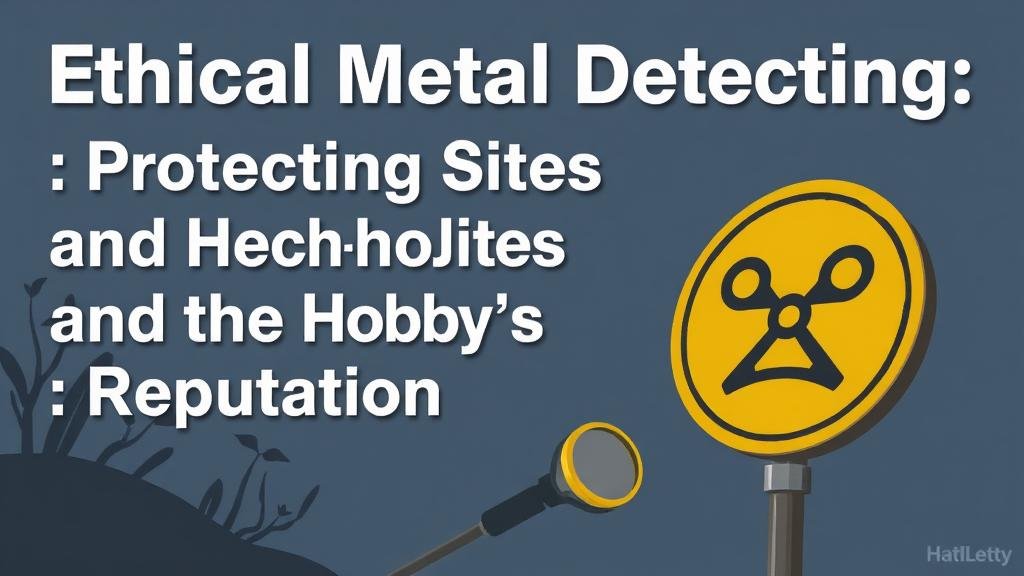Ethical Metal Detecting: Protecting Sites and the Hobby’s Reputation
Ethical Metal Detecting: Protecting Sites and the Hobby’s Reputation
Metal detecting is a beloved hobby for many, offering enthusiasts the thrill of discovery and the potential to unearth hidden artifacts. But, responsible practices in metal detecting are essential not only for cultivating a positive community reputation but also for safeguarding archaeological sites. This article explores the principles of ethical metal detecting, the techniques to protect cultural heritage, and how these practices can elevate the hobby as a whole.
The Importance of Ethical Metal Detecting
Ethical metal detecting goes beyond merely searching for relics; it involves a commitment to preserving history and respecting the environments in which detecting occurs. This moral framework is critical, especially in an age where archaeological sites are increasingly threatened by urban development and illicit digging.
According to a 2018 report by the National Park Service, approximately 50% of archaeological sites in the United States face significant degradation due to recreational activities, including metal detecting. Practitioners must be aware that their hobby can have a profound impact on these historical landscapes, necessitating a balance between personal enjoyment and ethical responsibility.
Best Practices for Ethical Metal Detecting
To foster a culture of respect and responsibility, metal detectorists should adhere to several established best practices:
- Obtain Permission: Always seek permission from landowners before conducting searches on private property. Consent is not only legal but also fosters goodwill with the community.
- Follow Local Laws: Understand and abide by local laws regarding metal detecting, including permits required in public parks or protected sites.
- Practice Leave No Trace: Fill in any holes dug during your search. This maintains the integrity of the landscape and diminishes the visible impact of your activity.
- Report Significant Finds: Notify local archaeologists or historical societies about significant artifacts you uncover. This can enrich historical records and contribute to local heritage preservation.
- Educate Yourself: Take advantage of training opportunities or workshops provided by local clubs or organizations. These resources can enhance your knowledge about historical contexts and archaeological methods.
Protecting Sites: Strategies for Conservation
Preserving archaeological sites is critical to maintaining our connection to the past. Metal detectorists play a pivotal role in this effort by adopting various conservation strategies:
- Site Assessment: Before searching an area, assess its archaeological significance. Sites that show signs of historical importance should be avoided to protect the integrity of potential finds.
- Collaborate with Professionals: Building relationships with archaeologists and local preservation groups can provide insights into valuable sites and enhance the knowledge base of hobbyists.
- Volunteer for Cleanup: Participate in local clean-up initiatives to promote environmental stewardship and demonstrate the positive contributions of the metal detecting community.
Case Studies: Impact of Ethical Practices in the Community
Examples exist across various regions where adherence to ethical practices has substantially benefitted both the hobby and heritage sites. In 2020, a group of metal detectorists in England, known as the Detectorists for Preservation, organized community clean-up events at historical locations while educating others on legal regulations and ethical practices. This resulted in an increase in public support and recognition of the hobbys contributions to heritage preservation.
Another notable case occurred when a detectorist uncovered a Roman coin hoard in a designated archaeological area. After immediately reporting the find to local authorities, further archaeological investigations were conducted, allowing experts to uncover additional artifacts and contextualize the site, enhancing public understanding of Roman footholds in the region.
The Role of Community and Advocacy
A thriving culture of ethical metal detecting relies on the support of the broader community. Organizations such as the Treasure Valuation Committee in the UK provide frameworks for reporting and valuing archaeological finds. By joining or forming clubs, detectorists can access guidance, share knowledge, and collectively advocate for responsible practices within and outside their communities.
Also, social media platforms have become vital tools for outreach and education. Awareness campaigns can effectively address common misconceptions about metal detecting, showcasing its potential for responsible treasure hunting rather than mindless excavation.
Actionable Takeaways
To wrap up, ethical metal detecting is not just about the thrill of the hunt but is an essential aspect of preserving our shared cultural heritage. By following best practices, engaging with professionals, and participating in community initiatives, detectorists can ensure that their hobby remains respected and beneficial. Ultimately, it is through collective effort and commitment to ethical considerations that the reputation of metal detecting can be enhanced, fostering a sustainable relationship with the past.



